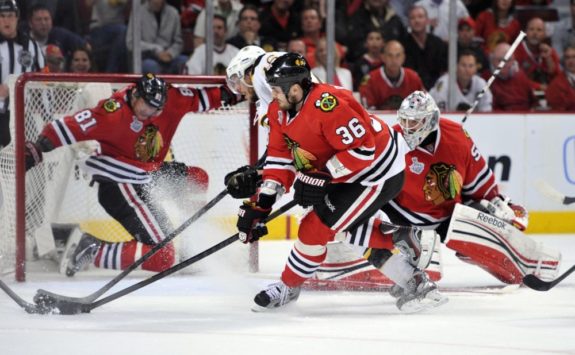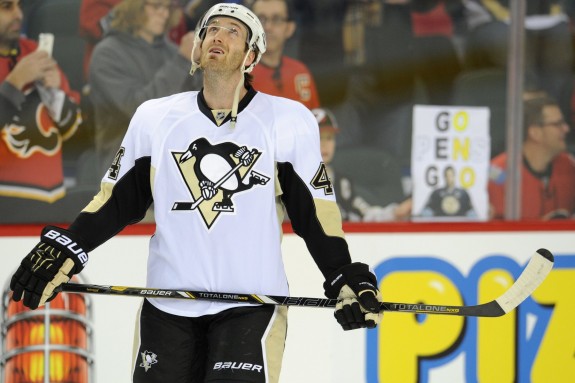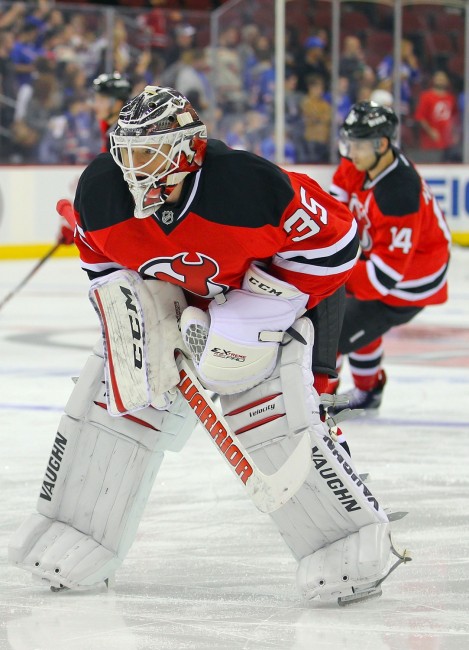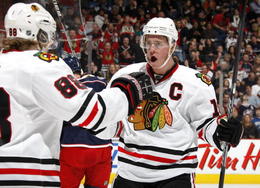This off-season thus far has seen a lot of activity in the NHL. New rising stars have been drafted, trades have been made in hopes of improving teams, and free agents have been signed to fill key areas. All of that is good for the league, it revitalizes teams and maybe even renews interest in fans who’ve become indifferent.
But there have been developments during this same period that may hurt the league too. Maybe not immediately, but some events have transpired that will very likely come back and haunt the NHL not too far down the road. Specifically, contracts and the decision making process that has gone into them.
The league has had lockouts and labour unrest over this exact issue in the not too distant past.
Salaries were deemed to be rising too high and owners were claiming it was impossible to do business, and thus, a salary cap was instituted. It was determined that a cap based on league revenue would keep contracts under control and everyone would win. So is it? Or are salaries once again going to plague the league?
It hasn’t gotten out of control yet, but fans have noticed a trend developing that has them very concerned about another labour disaster.
A Few Key Offenders
So here we are, not very many years after a stoppage, and history seems to be repeating itself. In the last couple weeks, we have seen a few contracts that have had fans mystified and openly criticizing various teams’ decision making capabilities.
David Bolland

Most upsetting so far is the David Bolland debacle. He has never scored 20 goals in the NHL, his best was 19 in the 2011-12 season. Yet Dale Tallon in Florida offered him a contract that averages $5.5 million for 5 years. To which David Bolland agreed, and probably with breathtaking speed that he’s never displayed on the ice.
Somehow, Bolland has managed to negotiate a contract based on what he might, do, someday, if things go really well. It’s like paying a CEO on profits he might generate for the company, not typically a commonly used financial model.
Brooks Orpik

Another puzzler to say the least, it’s on par with the Bolland fiasco. He got offered $5.5 million for 5 years by the Capitals, but the mystery is why. The last year of a contract is key when you are about to negotiate a new one, because right or wrong, what you have done lately seems to matter a lot.
When we look at last season, we understand Orpik isn’t an offensive defenseman, that’s fine. So was it his defensive prowess? Seems unlikely, he finished the year with a +/- rating of -3. Or, to look at it from another angle, 569th overall. That would make Shea Weber and Duncan Keith worth around $724 million a season.
Plus, some say Orpik moves like a slow, wounded turtle. Add that to the fact he isn’t good in his own end, and it makes this contract all the more hard to fathom.
Cory Schneider

I am a huge Cory Schneider fan, no one wanted him to leave Vancouver. He was due to be a UFA at the end of the coming season, and New Jersey wisely decided to sign him before the rest of the league could bid on his skills.
The part that doesn’t make sense is giving him a contract for $42 million dollars over 7 years. $6 Million a year for someone who went 16-15-12 last year, and has won 20 games once. People have proposed that you have to pay people a lot to play in New Jersey, but come on. Those that have previously complained about the Miller contract will really struggle with this one.
Toews/Kane

8 years $84 Million, for an average of $10.5 million a year each for these 2 guys. No one can argue that they are winners, they have Stanley Cups and Conn Smythe trophies and all the stuff you would expect stars to have.
They’ve earned a raise based on the sports world criteria, and big money was expected. But to the fans, this looks like the same kind of contract the league was in an uproar about when we lost a season, a lot of money over a long term.
The Immediate Impact
These kinds of contracts can set dangerous precedents. The concern now is that every 19 goal scorer will be using Bolland as a measuring stick, and thus, every 19 goal scorer will now be asking for a 5 year $5.5 million dollar deal.
Why wouldn’t they? People use salaries of people in similar positions all the time, particularly in the sports world. All these contracts appear to do is drive up the price of the mid-level players, and as a result, no one is going to be able to get a team on the ice because it’s clogged with players you would never give that kind of money to normally.
Would you be ok with paying Tyler Bozak, Mason Raymond and Tomas Tatar that kind of money? Because they scored 19 goals last year, the same as Bolland.
One could also point out that Justin Williams of the Kings also scored 19, but he is a playoff superhero, and that makes a world of difference. He has a Conn Smythe trophy and Stanley Cups, and the big picture would indicate he has enormous value as a player.
But we watch GM’s cave to demands regularly based solely on numbers and not the overall impact a player can have, and we are growing tired of it. Numbers do not tell the whole story and should not be the only factor in a negotiation.
The Solution
This time, it might not be the high end contracts that are the issue, as there aren’t that many people in the Toews and Kane range to demand similar salaries. Maybe the league can survive on what would likely be a relatively small amount of $10 million dollar contracts.
It’s the mid level players that have us concerned. However, to keep things from getting out of hand, the solution is simple: Show some self-restraint. It seems obvious that if teams in the league don’t start showing some impulse control, another strike will occur.
Many Diabetics can’t eat sweets or they’ll end up having something amputated, and thus, they practice self-control. GM’s around the league need to use this exact behavioural model or the consequences for the league could be just as severe.
Just start acting responsibly, and the frustrating thing for fans is, it’s not that hard. Step 1, don’t offer ridiculous contracts to your players. Step 2, if a player requests an excessively large amount for their services, say No. Is that too much of a complex myriad of business strategies?
If all General Managers followed these 2 simple steps, salaries would automatically come down and players would either accept them or pursue a career in the KHL. And don’t fool yourself, that isn’t really a consideration for most players who aren’t Russian.
There could be some light on the horizon. Mason Raymond, who was a 19 goal scorer himself last year, just signed a contract with Calgary for $3.15 million. The Flames managed to not get sucked in to the Panther financial abyss and struck a decent deal with the winger.
If indeed the overspending on the mid-range players is edging toward out of hand, you can bet that come the next CBA, the NHL will be looking at some kind of new contract to save them from themselves, and they can’t seem to do it without a work stoppage. So the question is, is there an issue, or are some of us worrying for no reason?
Good feedback guys. And thanks Shane, that kind of insight is exactly what I was looking for, an opinion on salaries and the effects they will have. And you are right, opinions on value will always be different.
I also liked Adrian’s stance on not caving in and overpaying for players. I think that’s essential for a team’s success. MacT’s view of “We got the player” is only rarely the right move. If you over payed a little for Justin Williams, ok. But GM’s too often don’t make a distinction. If General Managers stick to their guns a bit more, we will all be better off.
Good feedback guys, that’s what I was hoping to see.
Isnt this also the aftermath of the salary cap? Dun get me wrong I do like the cap but the cap floor is responsible for inflating these mid-level players salaries! I mean florida, Isles, calgary, edmonton, carolina & colombus all gave huge contracts just to get up to the cap floor. Unless the league sets the capfloor lower expect to see lots of those inflating deals upcoming years.
This is something that the fans in Detroit are criticizing the GM about NOT DOING. Holland refuses to cow-tow to these ridiculous free agent demands and the media touts it as “Detroit no longer is a Free Agent destination.” What a bunch of bologna. Fans are all butthurt that we don’t see mediocre veterans pining to come to Detroit in hopes of hoisting the Cup, all the while, values are being driven through the roof for nobodies like Orpiks and Niskanen for what? It’s something that I for one am glad that the majority of the fans have absolutely zero control of. I think the Detroit Red Wings continue to be a model organization and Hockey club that continues to succeed within the scope of what the NHL regulates all clubs to operate within. Here’s hoping that the madness around the league culminates in a Stanley Cup in Detroit for the 2014-2015 season so everyone can look back at this moment and say, “Damn, the Detroit Red Wings are smart because they won the Cup and they didn’t have to go out and overpay a bunch of free agents just to get the job done.”
BTW Adrain ken holland offered more money to dan boyle than the rangers http://www.usatoday.com/story/sports/nhl/wings/2014/07/03/red-wings-free-agency-snubs-reasons-for-optimism/12152099/
I think this is going to be a constant amongst fans thinking player salaries are excalating year after year. Think back to the 1980s when stars were making $300K and under with that considered a lot of money back then. Now stars are making $6M-$10.5M. It’s the same thing today. IMO I think you need to keep consistent with the % of cap space a star is worth, is 10% of the cap space fair for a star player? Is it 15% for generational players? If that’s the % for a star, what’s the % for a secondary guy who’s stats are 10-15 points off?
Even with that you get so many problems with everyone’s perception of what fair is and how much value to assign to a No.1 center, No. 2 center, top-pairing defenseman, starting goalie, secondary scorers etc etc..
It’s a great piece, I’m glad it was brought up and should get people talking. My perception/opinon of assigning value will always be different than yours, yours will always be different than Stan Bowman’s and Stan Bowman’s will always be different than Kevin Lowe’s etc etc.
Another thing too is how far someone in a role of spending/acquiring players is willing to go to sign a player? (as was the case in Edmonton when MacT said “ya well we spent the money BUT WE GOT THE PLAYER!).
Great piece Darrin